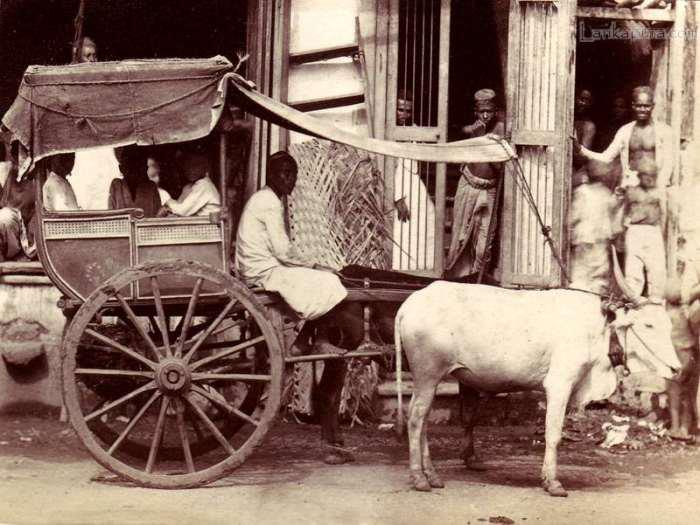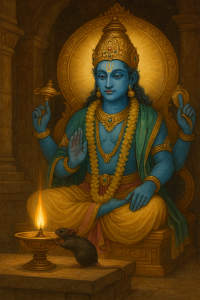The Story of Raikva – The Cart Driver
The Pride of King Janashruti
Long ago, there lived a king named Janashruti. He was known for his knowledge, piety, and immense charity. He took great pride in his generosity, believing that his merit could be measured by the amount of gifts and wealth he distributed to others. King Janashruti had also mastered the languages of birds and beasts, which only added to his sense of superiority.
One evening, as the king lay on the upper storey of his palace, admiring the twilight, he overheard a conversation between two swans flying by. One swan warned the other about the bright band of light emanating from King Janashruti, symbolizing his fame for abundant charity. The first swan cautioned the second to avoid crossing this light, lest it be burned by the king’s greatness.
The second swan, however, was unimpressed. “You speak as if this Janashruti is greater than Raikva, the cart-puller!” it replied. “The king may be famous, but he is driven by the desire for name and fame, which keeps him restless. His actions are motivated by his craving for praise.”
The first swan, surprised, asked, “Who is this Raikva, who, though just a cart-puller, is greater than the great Janashruti?”
The Search for Raikva
Hearing this conversation, King Janashruti became restless. The mention of Raikva, a man seemingly unknown to fame yet greater than himself, haunted him. Determined to find Raikva, the king sent his servant on a mission to locate this mysterious individual. After much difficulty, the servant found Raikva sitting under a cart, scratching himself. When asked if he was indeed Raikva, the man replied simply, “Yes, I am.”
The servant returned to the palace and informed King Janashruti of his discovery.
The Encounter with Raikva
King Janashruti, eager to learn from Raikva, made elaborate preparations. He went to Raikva with six hundred cows, a gold chain, and a mule-driven carriage, offering them all at Raikva’s feet. “Sir, be pleased to accept all this and teach me spiritual knowledge,” he requested.
Raikva, unimpressed by the wealth, retorted, “Take back the chain, the carriage, and the cows! Knowledge of the Self is not for sale!”
Undeterred, Janashruti returned later with even more: a thousand cows, a gold chain, a mule-driven carriage, and his own daughter as an offering. He humbly asked Raikva to teach him the higher truths of existence.
This time, Raikva was moved—not by the gifts, but by the king’s persistence and sincerity. Recognizing these as qualities of a true disciple, Raikva agreed to teach him.
The Teachings of Raikva
Raikva began by explaining the elements of creation, revered as gods: the wind that sweeps, the fire that consumes, and the vital breath that animates life. However, all these forces, Raikva explained, are moved by a higher power—the Spirit within. This Spirit is self-existing, not created by anyone, and yet it creates and sustains the entire universe.
“O king,” Raikva continued, “do not let pride or vanity corrupt your acts of charity. Give generously, but without egotism. Give freely, but not for the sake of fame. Give, not as something that belongs to you, but as something that the Spirit has given you to share with others. He who sees this truth becomes a true seer, lacking nothing and becoming the enjoyer of all things.”
King Janashruti was deeply satisfied with Raikva’s wisdom. Before departing, he gave Raikva a thousand milch cattle, numerous gold coins and chariots, and his own daughter in marriage. This time, Raikva accepted the offerings.
From then on, the village where Raikva lived came to be known as Raikvaparna, named after the wise philosopher who once was a humble cart driver.
Lessons to Be Learned from the Story of Raikva
- True Wisdom Is Beyond Material Wealth: The story teaches that spiritual knowledge and wisdom cannot be bought with material wealth. True understanding comes from sincerity, persistence, and humility.
- The Dangers of Pride and Vanity: King Janashruti initially believed his acts of charity made him the greatest, but the story shows that pride and the desire for fame can corrupt even the most generous deeds.
- The Importance of Sincerity and Humility: Raikva was moved by Janashruti’s genuine desire to learn and his humility, not by the king’s wealth. This illustrates the value of approaching life with sincerity and a willingness to learn.
- Understanding the Spirit Within: Raikva’s teachings emphasize that all elements of the universe are moved by a higher Spirit. Recognizing and aligning oneself with this truth leads to true contentment and wisdom.
- Giving with the Right Intentions: The story underscores that charity should be given selflessly, without seeking recognition or praise. Giving should be an expression of the Spirit’s will, not a means to boost one’s ego.
The tale of Raikva reminds us that true greatness lies not in wealth or fame, but in wisdom, humility, and the purity of one’s intentions.


